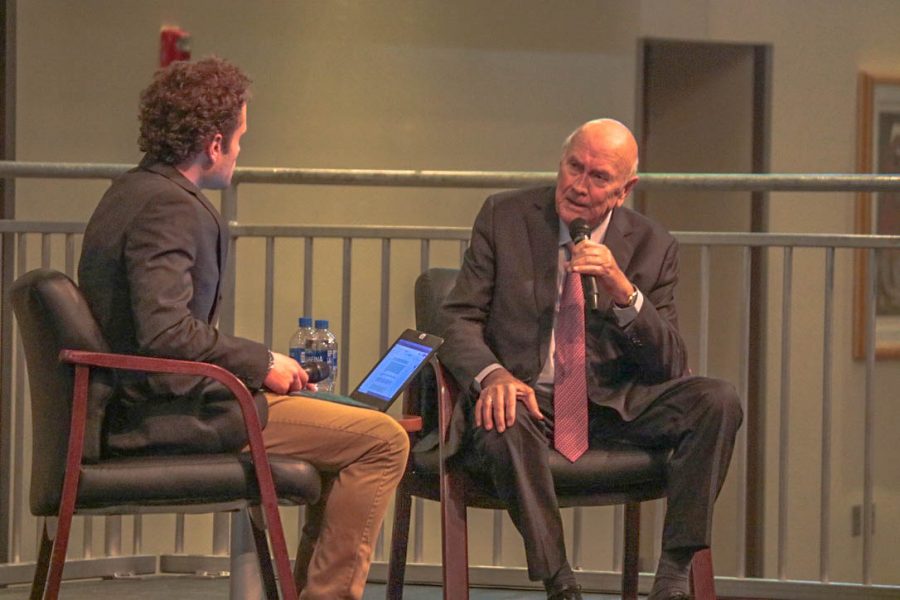The rise of 24-hour cable news and prime time commentary shows, along with the recent controversies surrounding Juan Williams, Rick Sanchez, and Keith Olbermann, have produced a growing public debate about the role and function of media in our society. While Sarah Palin laments the liberal bias of the “Lame-stream media,” organizations like Media Matters accuse the FOX News channel of functioning as a wing of the Republican Party. Unfortunately, they’ve all missed the point, and the media continues to fall into a death spiral. Jon Stewart, in his Rally to Restore Sanity, came closest to the truth when he declared before a crowd of 215,000 people (myself included) “We live in hard times, not end times. We can have animus without being enemies.” Stewart, unlike countless other media critics, recognized that the problem with media is much more pervasive and complex than bias. Bias is only a symptom of a disease that has plagued our media and threatens to dismantle responsible journalism.
To understand this disease, we must look beyond the bias wars. It is indisputable that FOX News, MSNBC, and CNN are all guilty of bias. I do not mean to suggest any false equivalency between these channels; I am only pointing out that bias exists to some degree in all of them. Rather than wade into the debate of which channel has the most bias, I want to examine the roots of bias, and the reasons that it plays a dominant role in our media. Journalists have always had bias; they are not robotic, impartial arbitrators. They are human beings, they have opinions, and they tend to vote. So the question must be asked, what about the media today allows these opinions, and personal biases, to become so obvious and dominant in political coverage? Once this question is asked, it becomes clear that the problem is not bias itself, but the way in which today’s media approaches journalism.
Turn on any cable news channel, and watch for an hour: CNN will show you a few thousand Tweets and Facebook posts anecdotally illustrating how Americans feel about the President, MSNBC will provide analysis explaining how Democrats will hold on to the White House in 2012, and FOX News will offer colorful commentary on the connections between America today and Russia prior to the Bolshevik Revolution. It is easy to only see the bias, but the real common thread is the dominance of process stories. In today’s 24-hour news cycle, 90% of the coverage is devoted to horserace politics, 9% is devoted to pretty graphics, and 1% is used for actually talking about substantive issues (unless a boy is trapped in a balloon in the sky). When the media focuses its attention on the horserace, it empowers bias.
The media’s coverage of health care legislation over the last year is a shining example of this problem. Health care reform addressed a number of systemic problems in our country’s health care system with complex regulations, oversight, and policy shifts. Rather than analyzing the problems with the current health care system, examining proposals to address them, and discussing the advantages and disadvantages of the individual components of legislation, the media chose to focus its coverage on the partisan bickering on Capitol Hill. Pundits amplified partisan talking points rather than digging deeper into the real issues at hand. More time was spent speculating on whether Democrats would pull together enough votes to pass the bill than on what was actually in the bill. While many pundits criticized lawmakers for not reading the bill, this criticism would have been better directed at journalists who were as ignorant about the bill’s content as anyone.
It is no wonder our electorate is so misinformed, our politics so divisive, and progress so difficult. We have traded our democracy for a game show. I am thankful for Jon Stewart for making a statement about the media, but we cannot stop with a comedian-led rally in Washington D.C. Furthermore, we cannot improve our media by pointing fingers and making accusations about those media sources that do not subscribe to our brand of bias. This perpetuates the problem — encouraging cable news channels to compete by producing the same crap in a different package.
We must demand accountability and responsible reporting. We must reinforce the most important pillar of our democracy, prioritizing quality news coverage over speculative process stories. We must stop giving our attention to pundits that scream the loudest and start listening to the journalists who prioritize substance over process, information over argument, and truth over presentation. As Jon Stewart put it, “If we amplify everything, we hear nothing.”
To find out about the upcoming elections and how to register to vote, visit www.sludems.com








